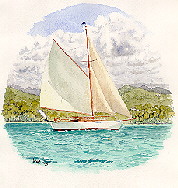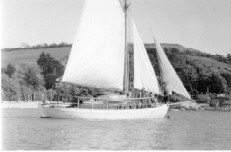R.I.P RIDUNA III

Like most sailors, wrecks have always fired my imagination; I have explored countless rotting hulks, poking about among crumbling timbers and rusting iron, secretly hoping to find something interesting to take away and treasure. Standing there on a rusting slanted deck, wondering who sailed her. What far off ports had she voyaged to and above all, how did she come to be cast upon this shore?
For once I know the tale, for this old wreck holds my first memories in life. She was my home for the first six years of my life, on her I had, perhaps, the best childhood a boy could wish for.
Nestled in a rickety cradle, propped up by balks of timber, even in death she retained her simple beauty. Her topsides were a faded canary yellow, trimmed in peeling red, setting off the graceful femininity of the wineglass curve of her full keeled hull. From under the green umbrella of a drooping Tamarind tree, she overlooked the white sand of a small beach and the shimmering turquoise of the bay. Her mast poked through the tree's embrace, fighting a losing battle with a young coconut palm, reaching for the sky.
In an emotional daze I beached our dinghy under her stern. Memories flooded my mind as I stood in the shallows. Swallowing the lump in my throat, I walked around her, to a rough wooden gangway placed against her side. Climbing the creaking steps I cast my eyes over Riduna's deck.
So complete was her neglect, her deck planks shrunken dry blackened slivers between wider gaps, terrible glimpses of her state below. Her foredeck sagged under the weight of her anchor winch. Missing only its pawl, the solid cast iron survived. A Paw Paw tree had rooted in the compost of the samson post, its leafy head eight feet above the deck. Her bronze portholes, long since removed, left a row of sightless eyes along her coachroof. A thick earthy carpet of tiny leaves from the Tamarind tree played host to a jungle of weeds, her decks a garden. Even in death, she was beautiful.
Gingerly I stepped onto her deck, careful to place my feet over the dubious security of the deck beams below the rotten planks. Half expecting the whole boat to collapse in a cloud of dust, I inched my way to her cockpit. Peering into the gloom of her cabin, she seemed so much smaller than I remembered.
Riduna III left England in 1968 for a six month holiday. In October 1994 she lies here, in Admiralty Bay, Bequia, in the Grenadines. Another name on her stern, I take the storytellers perogative as for me she will always be Riduna III. She has had her final sail.

Designed by Clive Mort, though obviously a close copy of a Colin Archer, she was launched as "Zero" in 1925. Her specification was as follows:
Length overall = 32.5
Waterline = 28
Beam = 10' 11"
Draught = 6'
British Registered Tonnage = 9.76
Construction = full length pitch pine on oak frames
Ballast = External in long iron keel
Engine = Ailsa Craig diesel
She had several names:
Launched as "Zero"
Later renamed "Mea Mater"
Then "Riduna III" by Major Arnold in 1935
Previous owners:
Major Arnold, 1935-57. Based in Alderney, Major Arnold cruised around the channel and up the West coast to the Clyde, for which he was awarded the Claymore Cup.
Col LHB Burlton
Hatchet Mead
Beaulieu
1957-? (He converted her to Bermuda rig)
Major Hugh McGildowney - we don't know exactly when he owned her.
Mr Roche of Cadaques, Spain, owner her for an unknown period to 1964. He bought her in the UK and sailed her back to Spain, then accross to the West Indies. He ran out of time there so had her delivered back to to UK in 1962. She sat in a mud berth at Moody's for two years, until an old friend, John Tudor-Owen, told my family about her.
My parents bought her from Mr. Roche in 1964 and converted her back to her original gaff rig on her original mast.
1972 - We sold her to John & Mary Tovey, in Grenada, West Indies. They generally took her apart but didn't finish the job.
The Tovey's sold her to David Edinburgh, who put her together again, only to let her go on a reef in Antigua. She was salvaged by someone and sold to our old friend:
Hodge Taylor of Bequia - He owned her from the seventies until she ended up on the beach for the last time. He raced her in the Bequia races for many years and though he had her re_fastened twice, the old dear couldn't take the fast pace forever. He took her out with the intention of doing her up again but never got round to it.
But all that is history, it was my childhood that flew through my mind as I stood at her grave side.

Taking leave from his civil engineering career, John and Jenny Evans sailed from England for France in 1968. The crew were three young children, Robin, Graham and Peter, aged five, four and eighteen months. After four months through Europe, via the French canals, we ended the season in Malta. Writing to his boss, my father extended his leave. We spent two summers exploring the Eastern Mediterranean. A popular cruising base, Malta was the starting point of many epic voyages; we made many lifelong friends there. Friends came and went. In 1969 a postcard arrived from friends reaching Barbados. Certainly before I knew what was happening, we were off.
We crossed the Atlantic at the end of '69. Surviving a night time collision with a super tanker, we repaired our broken mast in the Cape Verdes. On our way again, the sea was so full of life; every day was a new adventure. While many cross with barely a sighting of a whale, we saw many, some much closer than mum would have liked. To this day I remember being examined by an eye the size of a dinner plate as a huge whale twice Riduna's length rose up beside us. I wonder what he thought of me? A little boy full of awe, in the cockpit of our little ship in the middle of his ocean. Dorado danced in our bow wave. Every day was an adventure and an education for three young kids. The sun grew steadily warmer as the days went by. Wing on wing we sailed on. After a brief stop in Barbados, we met up with our friends in Grenada. Somehow Grenada took us under her spell and we were there much longer than expected.
We kids, we grew and grew. After eighteen months in Prickly Bay while Dad returned to England, to convert our London house to three flats, Riduna was bursting at the seams. My bunk was a small cupboard under one of the focsel berths. Something had to be done. We bought Kim at an auction, a beautiful wooden fifty-two foot Carl Alberg yawl. Neglected for three years Kim was a mess but bought for a song. We began the long task of restoring Kim to her former glory. Sadly we sold Riduna III.
We spent ten years in the Caribbean, mainly in Grenada. With Kim seaworthy we day chartered her for two years, taking some six hundred people out for the day. A family effort, we all took part. My mother roamed the tourist beaches for business, my father skippered, my brother handled the mainsail, my sister the jib and I the little mizzen. We all made drinks. With unstable politics, and growing, education hungry kids, we sold Kim and left for Canada in 1979.
Riduna passed through several owners before ending up back in the hands of an old friend in Bequia, Hodge Taylor. My facts from here are sparse and not all confirmed; I beg forgiveness for any inaccuracy.
A double ender, Riduna had very similar lines to the traditional sailing craft of Bequia. Hodge renamed her, "Moonbow of Bequia", increased her sail area, repainted her in bright local colours and heaved her engine overboard. Rumour has it, she did herself proud in the local regattas over the years. Such treatment of the old lady took its toll. Twice refastened, she ended up on the beach for the third overhaul. Sadly it never happened, for one thing or another she lay in her cradle until I found her seven or eight years later. Hodge looked guilty as hell when I showed up out of the blue, but I bear him no grudge. Such is life.
Wrenching my thoughts back to the present, standing there in the cockpit, I looked for some small piece to take away. I prised loose one of her brass fittings. She was to be burnt, Hodge had told me. I looked back at her until she was hidden from view as we motored away, back to our bareboat cruise. She still looked so lovely. I am proud to have had a piece of my childhood remain, with my heart, in my favourite corner of the Caribbean.
Back in England, in the living room of my parent's little house in Weston-Super-Mare, my father caressed the tarnished brass as I recounted my tale. Tears flowed, as they flow now. Rest in peace Riduna III. Rest in peace.
****************************

Page Hits Since November 20th 1997



